15 Toxic Plants for Pets
Keeping pets and houseplants can be tricky. Unfortunately, many plants that make our homes look beautiful are toxic to our furry friends. A few specific plants that are popular for their beauty and low maintenance needs should be avoided if you have pets. The following list includes some of the most common houseplants that can be dangerous to your animal companions. If pets ingest any of these plants, they should be taken to the vet immediately.
Whether you have cats, dogs, rabbits, or other small animals living in your home, knowing which plants can affect their health is important. For a list of pet-safe plants, shop easyplant's collection of pet-friendly plants!
1. Anthurium
Anthurium is a genus of flowering plants native to the tropical regions of the Americas. While these plants can produce beautiful flowers, they should be avoided if you have pets because all parts of the plant are toxic. This plant belongs to the Araceae family and has insoluble calcium oxalate crystals like other plants in the same family.
If you chew or bite this plant, the crystals will be released and may cause irritation in your mouth and gastrointestinal tract. In very rare cases, it may also result in swelling of the upper airway, which can make breathing difficult.
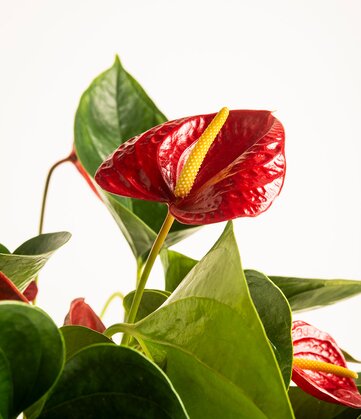
2. Begonia Maculata
Begonia Maculata are popular houseplants due to their bright spots on the leaves, which can bring life into any room. Unfortunately, they are also toxic to cats and dogs if ingested in large amounts.
The begonia plant contains large amounts of a substance known as oxalate. Once ingested, the oxalate crystals embed themselves in various tissues causing irritation and can break down into 'oxalic acid,' which is also a potent irritant. This can cause vomiting in a pet if ingested and should be avoided if you have animals.
3. Chinese Evergreen
Chinese Evergreen, just like Anthurium and other plants in the Araceae family, has insoluble calcium oxalate crystals. If you bite or chew on this plant, it can release these crystals that can irritate the tissues in your mouth and gastrointestinal tract.
The Chinese Evergreen is mild to moderately toxic and can cause liver and kidney damage. Symptoms may include oral irritation, pain and swelling of the mouth, lips and tongue, excessive drooling, vomiting, and difficulty swallowing.
4. Dracaena / Dragon Tree
The Dracaena plant, popularly found in households and also known as the Dragon Tree, is highly toxic to pets if consumed. In dogs, it may cause drooling, vomiting, weakness, incoordination, and in cats, it can lead to dilated pupils. The Dragon Tree can specifically cause additional symptoms in cats such as vomiting (which may include blood), anorexia, hypersalivation, depression, lack of grooming, increased aggression, lethargy and weakness, excessive sleeping, or hiding. Ingestion by dogs may lead to stomach irritation and oral pain, potentially requiring hospitalization depending on the severity of the poisoning. It's crucial to contact your veterinarian immediately if your pet ingests any part of this plant.
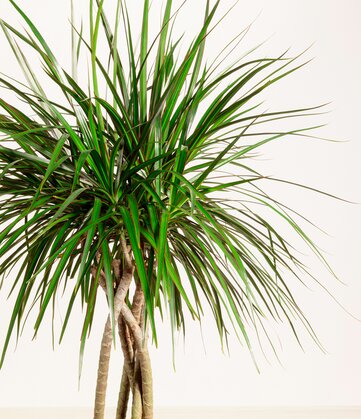
5. Ficus / Rubber Tree
The Ficus plant, or the Rubber Tree, has sap in its leaves that can be harmful to pets if they touch or eat any part of it. This can cause irritation due to the enzymes in the sap, leading to symptoms like swelling or irritation of the mouth, tongue, and lips, excessive drooling, vomiting, and difficulty swallowing. In cats, these symptoms can also include diarrhea, vomiting, rashes, stomach upset, and in some cases, prolonged exposure can cause skin inflammation. Despite their low maintenance and popularity, it's important to keep these plants away from pets.
6. Fiddle Leaf Fig
If your pets eat any part of a fiddle-leaf fig plant, they could become sick due to the toxins in the plant. The plant's leaf is the most dangerous part because it contains a toxin known as sapogenin.
Fiddle leaf plants can also cause mild toxicity because the needle-like raphides it contains can cause a burning sensation, causing most pets to spit out the plant immediately. Dogs that ingest this toxin may experience vomiting and diarrhea as part of gastrointestinal symptoms, and cats may show signs of mouth irritation, vomiting, and difficulty breathing.
7 . Kalanchoe Blossfeldiana
Kalanchoe is a popular and attractive houseplant with many flowers in various colors, including yellow, orange, pink, or red. It belongs to a group of plants with cardiac toxins (bufadienolides).
Although ingestion by cats and dogs can cause gastrointestinal irritation or upset, Kalanchoe toxicity can lead to tremors, seizures, and heart arrhythmias. If you think your pet has eaten Kalanchoe, you should contact your veterinarian immediately.
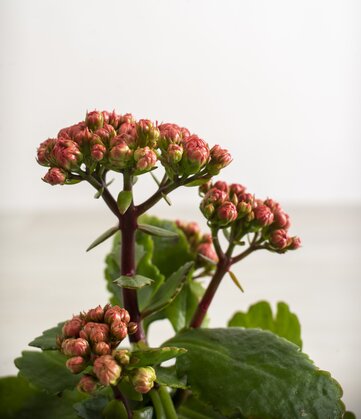
8. Monstera
Though a common houseplant, Monsteras can be toxic plants for pets. Your monstera plant contains calcium oxalate crystals in all parts, such as stems, leaves, roots, and unripe fruit, wherever the sap flows. The calcium oxalate crystals found in the Monstera plant can cause irritation to the mouth and stomach if ingested by your pet.
Although your cat or dog may exhibit symptoms of pain and irritation after consuming Monstera, they should be alright. However, it is recommended that you keep your pet away from the plant at all times.
9. Philodendron
Philodendron is a popular houseplant that can be dangerous for your pets. It contains oxalate crystals found in the plant's leaves, stems, and roots. If ingested by cats or dogs, these can cause oral irritation, excessive drooling, vomiting, difficulty swallowing, and nausea.
If your pet eats philodendron, it's important to contact your vet immediately, as consuming a large amount of philodendron can lead to serious respiratory and digestive problems that may even be deadly.
10. Pothos
Pothos plants are great for both offices and homes as they are low maintenance. However, it's important to note that they are not pet-friendly. All types of Pothos plants are toxic to cats, dogs, and some other pets and can cause swelling of the GI tract and mouth if ingested by pets.
Additionally, if your pet chews or ingests any part of the Pothos plan, it will cause discomfort and irritation in their mouth. However, with the appropriate supportive care, most dogs can recover fully from pothos toxicity.
11. Rhaphidophora Tetrasperma
Rhaphidophora tetrasperma, like other aroids, contains calcium oxalate and calcium carbonate crystals which are toxic to both humans and pets. If your pet ingests this plant, it may show signs of oral irritation, excessive drooling, vomiting, and mouth irritation.
The entire plant is toxic to humans, as well. Consuming or chewing it may cause tingling or burning sensations and swelling of the lips, mouth, and tongue. It can also cause contact dermatitis in people who are sensitive to it.
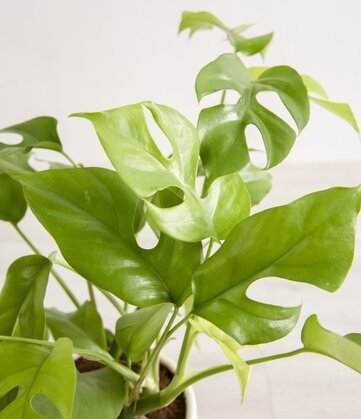
12. Schefflera
The Schefflera, or Umbrella Tree plant, has toxic compounds throughout all its parts, such as insoluble calcium oxalate crystals, saponins, and terpenoids. If a pet chews on this plant, it releases these compounds that can irritate any tissues they come into contact with.
Chewing or swallowing any part of the plant can lead to cardiac arrhythmia, diarrhea, dilated eyes, difficulty in swallowing, and excessive drooling due to the presence of crystals.
13. Snake Plant
The snake plant can be harmful to dogs because it contains saponins, a toxin that can cause a range of adverse effects if your dog eats it. The toxin's severe gastrointestinal activity leads to the rupture of red blood cells. Saponins cause foaming action that could cause gastrointestinal distress.
If your dog ingests snake plants, the signs of adverse effects include vomiting, diarrhea, drooling, and weakness. Contact a vet immediately if you notice any of these symptoms in your pet after they've been near the plant.
14. White Bird of Paradise
The White Bird of Paradise is toxic to pets because it contains hydrocyanic acid. Although symptoms are usually limited to mild gastrointestinal upset, such as vomiting, diarrhea, and reduced appetite, there have been some reports of lethargy and ataxia (unsteady movement).
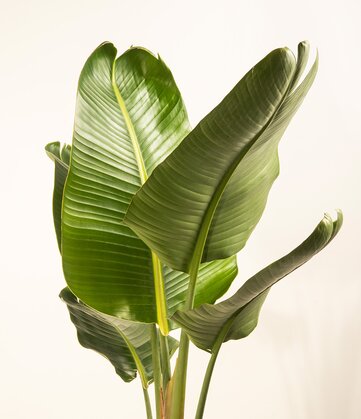
15. ZZ Plant
The ZZ Plant, also known as Zamioculcas Zamifolia, is a resilient indoor plant that can thrive in very little light. However, it is important to note that it is poisonous to both humans and pets, with all parts of the plant being considered toxic.
Eating any part of the Zamioculcas zamiifolia plant can cause vomiting and diarrhea in dogs. This plant is poisonous to both humans and animals when consumed. As a precaution, it is advised to wash your hands after handling the plant.
Shop easyplant’s Pet-Friendly Plant Collection Today!
Pets are family, and that means making sure you keep them safe and healthy. easyplant makes it easy for pet owners to keep their furry friends safe by providing a selection of pet-friendly plants so you can enjoy having greenery in your home without worry. So check out our Pet-Friendly Plant Collection today!
